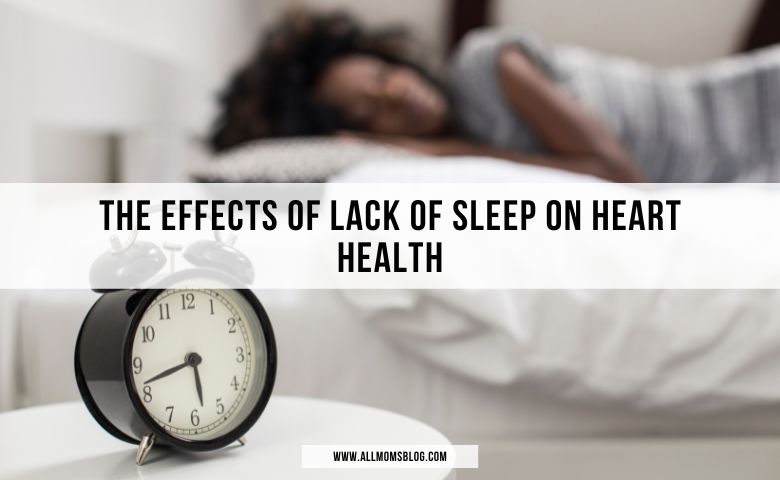If you are facing troubles with your heart, it’s possibly because of a lack of proper sleep. Most of us think that sleep is just a way to pass the time. But sleep is essential for your health, especially for your heart.
Undoubtedly, time is a precious commodity for all of us. We often sacrifice sleep to catch up with our day-to-day tasks. However, we cannot lay less stress on the importance of sleep. There is an intricate relationship between your sleep and the health of your heart.

Here, we will explore why you need to build a proper sleep routine to maintain your heart health.
Importance Of Sleep for Heart Health
When you sleep, you don’t only rest. Your body undergoes a very crucial physiological process during this time. This process allows your body and mind to rejuvenate so that when you wake up you feel fresh.
Sleep is essential to maintain your cardiovascular health and your overall well-being. It affects your cognitive function and emotional stability.
Research has also shown that there is a great relationship between the quality and duration of your sleep. If you understand this connection, it will help you adopt healthy habits to maintain your well-being.
So, let’s begin by understanding sleeping and its stages.
Understanding Sleep And Its Stages
The process of sleeping has different stages. For example, sometimes you take a light nap. On the other hand, sometimes, you might find yourself in deep sleep.
There is also a stage called the Rapid Eye Movement sleep. Every stage in the sleep cycle has its own role in helping you maintain your body functions. In this stage, you start dreaming vividly.
Deep sleep, on the other hand, helps you restore your physical strength and release the growth hormones in your body.
So, it’s essential that you strike about between the stages to keep yourself healthy and well-rested.
how much sleep do you need to be healthy?
Generally, an adult needs 7 to 9 hours of sleep per night. If you don’t sleep well for this duration every night, your body will not be able to go through complete sleep cycles.
But every individual doesn’t need to aim for 7-9 hours of sleep. Every person’s sleep duration can vary. You just need to pay attention and understand your body’s signals. For example, if you often feel fatigued or experience difficulty concentrating, your body might just be signalling you to adjust your sleep duration or quality.
Also aiming for the recommended sleep duration is not enough, getting a night of good quality sleep is also essential. Only then can your body work to its full potential in keeping you and your heart healthy.
Lack of Sleep and how it Indirectly Worsen Heart Conditions
Not sleeping enough can lead to sleep disorders. These days, inadequate sleep often leads to problems like insomnia, sleep apnea, and Restless Leg Syndrome. That’s just not it. A lack of sleep is also related to several chronic diseases that can impact your heart.
Let’s look at the relationship between sleep and heart health and how it will impact your heart if you don’t get proper sleep.
1. Irregular Blood Pressure
During sleep, your body undergoes several natural changes in your blood pressure. When you first sleep, there is a decrease in your blood pressure. It happens especially when you are in the stage of a deep sleep.
This decrease in your BP is crucial for your cardiovascular health. It allows you to let your heart and blood vessels rest and recover. However, if you have sleep deprivation or any sleeping disorder, you might end up having irregular blood pressure.
Sometimes, lack of sleep can also lead to a chronic high blood pressure problem. So, you are at greater risk of developing heart disease or a stroke.
2. Heart Rate Variability
The variation in time between your heartbeats is called Heart Rate Variability. HRV is a natural occurrence in a person’s body. Inadequate sleep that also lacks quality can negatively impact your heart rate variability.
If there are a lot of sleep disturbances, you might experience a reduction in your heart rate variability. It can lead to an increased risk of several heart diseases.
Getting a good night’s sleep will help you maintain better cardiovascular health. It is so because proper sleep impacts HRV in a positive way. So, your body can easily adapt to various stressors.
3. Inflammation
Inflammation is bad for your heart health as it can make you a victim of several heart diseases. Your body might be able to recover from occasional inflammation easily.
However, if inflammation becomes a chronic problem in your body, it can contribute to various cardiovascular diseases.
That’s why sleeping is essential for you. When you are in a deep sleep, your body produces cytokines that help in regulating inflammation. Sleep deprivation can disrupt the process of cytokines production.
4. Cholesterol Metabolism
Increased levels of cholesterol in your body are the cause of several heart diseases. You might end up triggering the cholesterol levels in your body when you get inadequate sleep. Sleep is linked to your body’s ability to regulate its cholesterol levels.
Your body converts cholesterol into several hormones when you sleep. This process often takes place during the Rapid Eye Movement stage. If there is a disruption in the sleep cycle, there can be interference with this process.
These disruptions lead to imbalances in the cholesterol levels of your body. As a result, you face an increased risk of cardiovascular issues.
5. Insulin Sensitivity
These days, diabetes has become a common issue for most adults. Surprisingly, even teenagers are at the risk of developing Type II diabetes. Of course, there are several factors that put you at risk of diabetes. But, sleep is closely tied to insulin sensitivity.
Sleeping well helps you manage your blood sugar level and maintain insulin sensitivity. However, if you sacrifice your sleep, your body develops a reduced insulin sensitivity putting you at greater risk of developing diabetes.
Diabetes is just like a slow poison that affects your heart health with time. Getting proper sleep is one of the ways to maintain metabolic function and reduce the risk of developing diabetes
6. Blood Clotting And Platelet Function
Adequate and quality sleep will help you maintain the balance of blood clotting factors. To maintain your cardiovascular health, it is important that there is just the right amount of clotting.
During your sleep cycle, your body looks to prevent excessive clotting. Otherwise, you are at risk of developing conditions like deep vein thrombosis for pulmonary embolism. Clotting can also lead to other cardiovascular events.
Similarly, if there are disruptions in your sleep patterns, you might experience an imbalance in your platelet function.
You need platelets to form blood clots so that your wounds do not bleed a lot when you are hurt. Irregular sleep can contribute to the formation of unwanted clots. In such a case, you may experience heart attacks and strokes.
7. Nervous System Imbalance
Sleep helps you maintain a delicate balance between the sympathetic and parasympathetic branches of your nervous system. These branches are helpful in regulating your cardiovascular health. Any sleep disturbances can tip off this balance.
As a result, you might experience an increased stress on your heart. This stress can often cause strokes or heart attacks.
8. Improper Cardiac Function
If not getting restorative sleep, your cardiac function cannot be optimal. As mentioned before, your heart undergoes repair and maintenance work when you are in a deep sleep. So, there is efficient blood pumping and circulation in your body.
Chronic sleep deprivation or poor sleep can lead to cardiac strain and increase the risk of heart complications.
6 Common and possible Sleep Disorders
Sleep disorders often cause disruptions in your sleep patterns. Let’s take a look at some common sleep disorders that affect your heart health.
1. Insomnia
During Insomnia it’s difficult to sleep. You might have short-term sleeping issues or insomnia can also become a chronic condition. This sleeping disorder arises from stress, anxiety, or any other underlying heart condition.
2. Sleep apnea
Sleep apnea is a sleeping disorder where your breathing repeatedly stops and starts while you sleep. It happens because of the relaxation of your throat muscles which affect your breathing patterns.
Sleep apnea can lead to excessive daytime sleepiness. It also increases the risk of cardiovascular diseases.
3. Narcolepsy
Narcolepsy is a neurological disorder in which your brain is unable to control your sleep-wake seconds.
People with the sleep disorder experience sudden and uncontrollable episodes of falling asleep. This disorder makes you fall asleep even during the day or in inappropriate situations.
4. Restless Leg Syndrome
When you have an irresistible urge to move your legs and uncomfortable sensations in your body, it is a symptom of restless leg syndrome. These symptoms can be heard when you are undergoing periods of inactivity.
Restless Legs Syndrome is very common when people with this disorder are sitting or lying down. It can lead to a disruption in your sleep cycle.
5. Periodic Limb Movement Disorder
PLMD causes repetitive involuntary movements in your body when you are sleeping. These moments are common in the legs and can make you wake up from your sleep very often. PLMD results in destructed sleep patterns.
6. Parasomnias
Parasomnias involve abnormal behaviours or movements when you sleep. For example, you might sleep, walk, or have night terrors while sleeping.
Some people also experience sleep-related eating disorders. These disorders interfere with restorative sleep which affects your heart health.
6 ways to improve sleep quality and heart health
If you want to maintain your heart, you need to make changes in your sleep cycle. The below-mentioned tips will help you in maintaining good physical and mental health.

1. Have A Consistent Routine
You should aim to go to bed early and at the same time every day. If you are struggling with sleep disorders. It is important that you follow a consistent sleep schedule even on weekends.
When you are consistent, you can easily regulate your body’s internal clock. So, you experience better overall quality of sleep.
2. Create A Comforting Bedtime Routine
Having a comforting bedtime routine will signal your body that it’s time to doze off. You can develop bedtime activities such as taking a warm bath or reading a book. It’s also helpful to practice some relaxation exercises to help you transition to sleep.
3. Have A Conducive Sleep Environment
You can try to make your bedroom more conducive to sleep by keeping it cool, dark, and quiet. It can be really helpful if you invest in a comfortable mattress and pillows, it will help you support a good night’s sleep.
4. Avoid Screens Before Bed
Your phones, tablets, and computers emit blue light that can interfere with the production of melatonin. If your body doesn’t produce enough melatonin, you might have difficulty in getting a proper sleep.
So, you should try to turn off your electronic devices, at least an hour before it’s time to wind down.
5. Eat Healthy
Eating healthy doesn’t mean that you should load your stomach before bed. Eat good quality food in an adequate quantity for dinner.
You should avoid heavy meals and caffeine when it’s close to your bedtime. It’s also best that you stay away from nicotine when it’s time to sleep. These substances can hinder your sleep and your ability to fall asleep.
6. Exercise Regularly
Exercise helps promote good sleep. But it’s important that you try to complete your workout some hours before your bedtime. If you undertake an intense activity close to your bedtime, it can have the opposite effect.
Conclusion
Stress, unhealthy food choices, and a lazy lifestyle can risk your heart’s health. But these are not the only factors that make you a victim of cardiovascular diseases. You can also suffer from heart issues because of a lack of sleep. Sleep and heart health have a crucial relationship that promotes your holistic well-being.
Getting good sleep keeps your heart healthy. However, sleep deprivation can often lead to several sleep disorders that are not good for your heart.
So, it’s essential that you incorporate good sleeping habits and a sleep-friendly lifestyle. It will help you improve your health, vitality, and longevity.
Related Articles:
Unlocking Stronger Bones: 12 Essential Nutrition Tips For Women’s Bone Health
13 Affordable Stress Relief Ideas For Moms
7 Best At Home Workouts For Busy Moms To Look And Feel Great
10 Ways To Boost Your Family’s Immune System
13 Ways To Invest In Yourself As A Mom
15 Top Foods That Help You Sleep Better
10 Health And Fitness Tips For Busy Moms
Mommy And Me Exercises: Fun Ways To Bond And Get Fit With Your Baby With Videos
Nutrition During Pregnancy: 14 Best Foods To Eat
Don’t forget to pin it for later!

The Effects of Lack of Sleep on Heart Health
Dr. Vishal Khullar
Dr. Vishal Khullar is a leading Cardiovascular & Thoracic Surgeon in Mumbai,India, currently directing the Cardiothoracic and Vascular Surgery department at Nanavati Max Super Speciality Hospital, Mumbai. With over 30 years of experience, he specializes in complex procedures, including Heart Surgeries and Lung Transplants. He returned to India after working at globally acclaimed institutions like the Cleveland Clinic and Mayo Clinic, with a vision to establish a state-of-the-art Heart & Lung Transplant Program.
